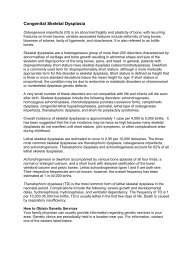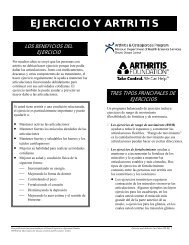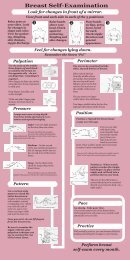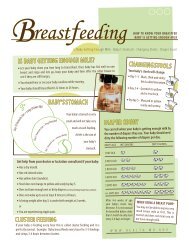Prevention and Control of Communicable Diseases - Missouri ...
Prevention and Control of Communicable Diseases - Missouri ...
Prevention and Control of Communicable Diseases - Missouri ...
You also want an ePaper? Increase the reach of your titles
YUMPU automatically turns print PDFs into web optimized ePapers that Google loves.
July 2011<br />
HEPATITIS B VIRUS AND PREGNANCY<br />
What is hepatitis B <strong>and</strong> what illness does this cause?<br />
Hepatitis B is a viral illness. The hepatitis B virus infects the liver <strong>and</strong> can cause serious disease.<br />
Persons who are newly infected with hepatitis B virus (acute infection) may develop symptoms such as<br />
loss <strong>of</strong> appetite, tiredness, stomach pain, nausea, vomiting, dark (tea or cola-colored) urine, lightcolored<br />
stools, <strong>and</strong> sometimes rash or joint pain. Jaundice (yellowing <strong>of</strong> eyes or skin) may also be<br />
present. Some people have no symptoms at all <strong>and</strong> may not know they have been infected. If the<br />
virus is present for more than six months, the person is considered to have a chronic (lifelong)<br />
infection. As long as persons are infected with the hepatitis B virus, they can spread the virus to other<br />
people.<br />
Is hepatitis B serious?<br />
Most people who have an acute infection recover without problems. Approximately 90% <strong>of</strong> infected<br />
infants will develop chronic infection. The risk goes down as a child gets older. Approximately 25%<br />
to 50% <strong>of</strong> children infected between the ages <strong>of</strong> 1 <strong>and</strong> 5 years will develop chronic hepatitis. The risk<br />
drops to 6% to 10% when a person is infected over 5 years <strong>of</strong> age. Most people who are chronically<br />
infected have no symptoms <strong>and</strong> feel healthy. However, some people do develop non-specific<br />
symptoms at times when the virus is reproducing <strong>and</strong> causing liver problems. People with lifelong<br />
hepatitis B infection can develop cirrhosis <strong>of</strong> the liver, liver cancer, <strong>and</strong>/or liver failure, which can lead<br />
to death.<br />
If I've been exposed to someone infected with the hepatitis B virus, what should I do?<br />
An exposure is defined as contact with blood or other body fluids <strong>of</strong> an infected person. Contact<br />
includes touching the blood or body fluids when you have open cuts or wounds (that are less than 24<br />
hours old or wounds that have reopened), splashing blood or bloody body fluids into the eyes or<br />
mouth, being stuck with a needle or other sharp object that has blood on it, or having sex or sharing<br />
needles with someone with hepatitis B virus. A baby can get hepatitis B from its infected mother<br />
during childbirth. It is not spread through food or water or by casual contact (e.g., shaking h<strong>and</strong>s or<br />
kissing the face <strong>of</strong> a person who is infected with hepatitis B).<br />
Everyone who has an exposure to a person infected with hepatitis B virus should have blood tests done<br />
as soon as possible to determine whether treatment is needed.<br />
At the time <strong>of</strong> exposure, persons who have never had the disease or vaccine (susceptible to the virus)<br />
should receive a dose <strong>of</strong> hepatitis B immune globulin (HBIG) <strong>and</strong> the first dose <strong>of</strong> hepatitis B vaccine.<br />
Doses two <strong>and</strong> three <strong>of</strong> the vaccine series should be completed on schedule. In some cases, people<br />
who have already been vaccinated may be tested <strong>and</strong>/or revaccinated.<br />
How will this exposure affect my pregnancy?<br />
If a mother develops hepatitis B during her pregnancy, there is a chance that the baby may also<br />
become infected. If the mother develops acute hepatitis in the third trimester <strong>of</strong> pregnancy or the<br />
immediate postpartum period, the risk <strong>of</strong> infection for the newborn baby may be 60% to 70%. It is<br />
very important that the baby receive treatment right after birth to get as much protection as possible.<br />
25
















